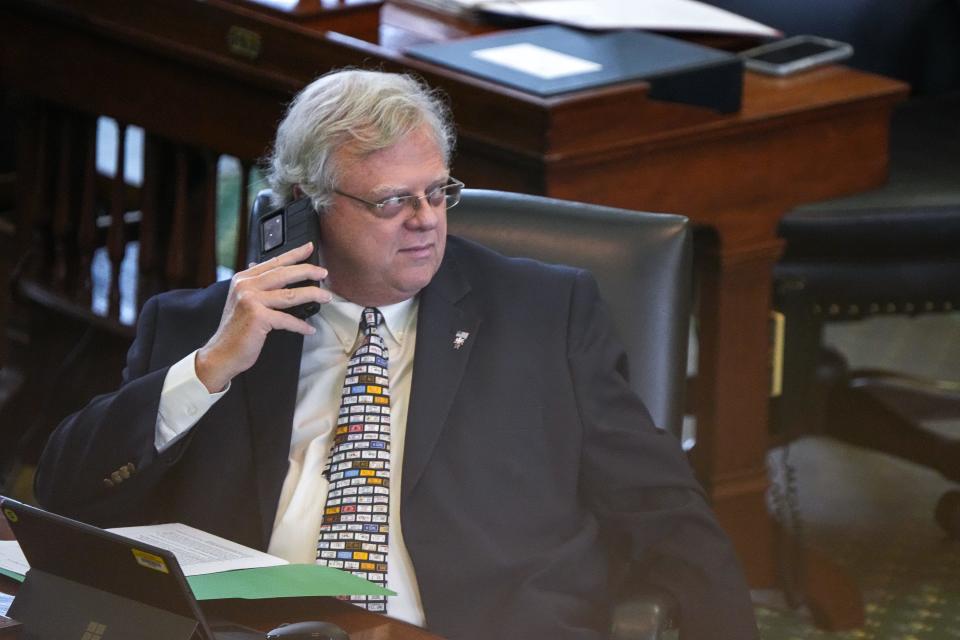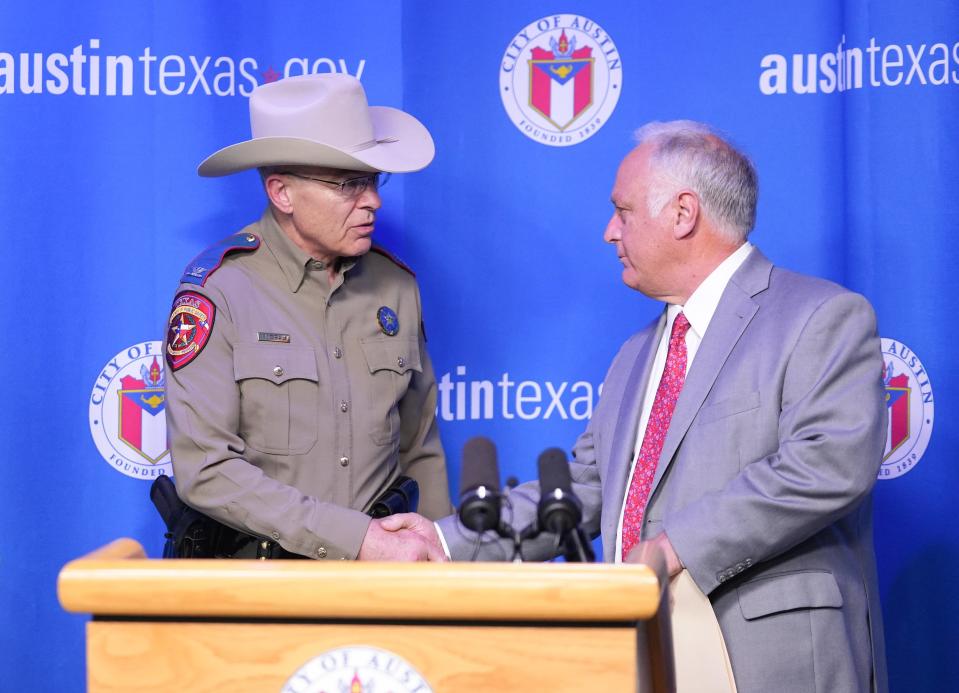Texas Senate advances bill to create 'election marshals.' Here's what's proposed.
- Oops!Something went wrong.Please try again later.
The Texas Senate has advanced a proposal that would require the secretary of state to appoint a chief election marshal, who in turn would name election officers in regions throughout the state, to investigate suspected election violations.
Senate Bill 220, by Sen. Paul Bettencourt, R-Houston, would provide the secretary of state, who serves as the chief elections officer in Texas, an avenue "to immediately address election violations as they are occurring," according to the bill's analysis.

The proposal, which the Senate approved Wednesday, would call in the Texas Department of Public Safety to protect poll watchers, ensure ballots are handled through the proper chain of custody and provide security on election days, among other tasks.
"One of the problems is that there's simply no tools to make sure that there's not voter intimidation," Bettencourt said while laying out his proposal earlier this month during a Senate State Affairs Committee hearing.
More: Law enforcement at the polls? Senate proposal seeks to create 'election marshals'
During the bill's second reading on April 18, Democratic representatives raised concerns that the bill could result in possible voter intimidation and racial discrimination.
"Civil rights history has shown when it comes to voting, when it comes to civil rights, people of my color, my race, have been intimidated by law enforcement," said Sen. Borris Miles, D-Houston. "And this going to happen the same way it happened in the past."
In a testy exchange between the two Houston lawmakers, Bettencourt combatted claims the bill introduces racial bias and the possibility of voter intimidation, and countered that the bill will help ensure election credibility.
"It is not an attempt at voter suppression," Bettencourt said during one of the bill's readings last week.
The chief state election marshal would appoint election marshals in each DPS region — there are seven across Texas — for every 1 million people who reside in that region, according to the bill. The appointments would be made no later than the 60th day before early voting begins in uniform November or primary elections. The appointments would last 90 days but could be extended if a marshal is investigating an election violation.
Election marshals would have to be licensed peace officers commissioned by the DPS and have received training on election law by the secretary of state's office, according to the bill. The election marshal unit would be about 30 strong given the state's population.
"Isn't this a bit overreaching?" asked Sen. Carol Alvarado, also a Houston Democrat. "This is like taking a sledge hammer to swat a fly."
More: Texas Senate confirms Jane Nelson as secretary of state, two months after taking office
DPS Director Steven McCraw said during committee testimony earlier this month that if the bill becomes law his department will follow the Legislature's mandate. Although, he expressed a need to ensure there is proper training in investigating and handling election day cases as this has never been under the agency's purview.
"This is a different thing outside our lane in that regard," McCraw said during a Senate State Affairs meeting this month. "Want to make sure whoever is involved has got the appropriate training, and, of course, as the Legislature directs we will certainly do."

McCraw suggested that DPS special agents serve as election marshals instead of standard state troopers, as agents have more investigative experience and authority.
Opponents of the bill have rallied against the proposal, calling it another attempt to suppress voter participation in Texas. They also cited concerns over the partisan control of the new investigative enterprise and the state's recent difficulty in appointing and keeping secretaries of state in office.
"Voters and election workers are afraid that they will face criminal charges from innocent mistakes," said Nicole Patterson, a Harris County voter who testified against SB 220 in committee. "This bill will chill voter turnout and make it more difficult to recruit election workers who may fear malicious prosecution."
The bill would also require an emergency election review judge — who would be appointed by the presiding judge in each administrative judicial region no later than 60 days before an election — to hear possible violations related to early voting within three hours of a written request, and that window would shrink to one hour on an election day.
More: Texas Senate approves tougher penalties for illegal voting. Here's what lawmakers propose.
Opponents said they are concerned by the timeframe election judges would have to review emergency election cases and the impact on representation for those who are accused of wrongdoing.
"Accordingly, it's unreasonable to expect them to participate without consulting with an attorney," said Andrew Hendrickson with ACLU Texas during committee testimony. "Which would frequently be impossible under the deadline set by the bill."
Outside of the new election law enforcement division, the Senate considered a proposal from Sen. Bob Hall, R-Edgewood, that would ban counties from being able to conduct a countywide polling program.
The bill would only apply the restriction on election day after an amendment to the bill was introduced Thursday.
More than 90 counties currently use countywide polling, which allows eligible voters to cast a ballot at any countywide location as opposed to a specific precinct, Hall said while laying out SB 990.
"If I had my way completely, it would be both periods," Hall said about extending the countywide prohibition to early voting.
When questioned by Sen. Roland Gutierrez, D-San Antonio, on where the issue of election inaccuracy and potential fraud has occurred based on countywide polling, Hall did not give specifics but mentioned Harris and Smith counties.
"You have no evidence to prove anything that you're saying," Gutierrez said.
"I'm saying we don't know, there's nothing to be proven," Hall responded.
The bill passed to the House by a 17-12 partisan split vote Thursday.
"You're creating a really political issue for folks that have become accustomed to voting either at the courthouse downtown, or a county courthouse annex," said Sen. John Whitmire, a Democrat from Houston and the chamber's longest serving member. "And now we're going to prohibit that practice."
The election marshal bill that advanced Wednesday and Hall's proposal join a number of Senate bills that have passed the upper chamber seeking to tighten election processes, add to voter registration requirements, target elections workers and allow Texas to leave a current voter registration cross check program in favor of a future state-created program.
A marquee priority for Lt. Gov. Dan Patrick, Senate Bill 2 would reinstitute a felony charge for illegal voting, which was dropped to a misdemeanor in the 2021 legislative session. The legislation was the first priority bill to be forwarded to the House this session.
This article originally appeared on Austin American-Statesman: Texas Legislature: Senate OKs proposal to create 'election marshals'

